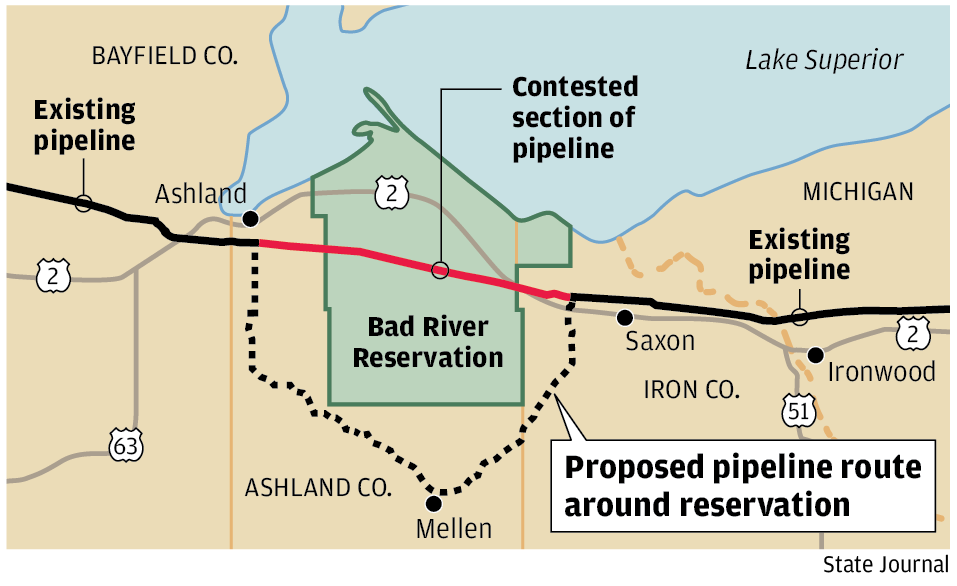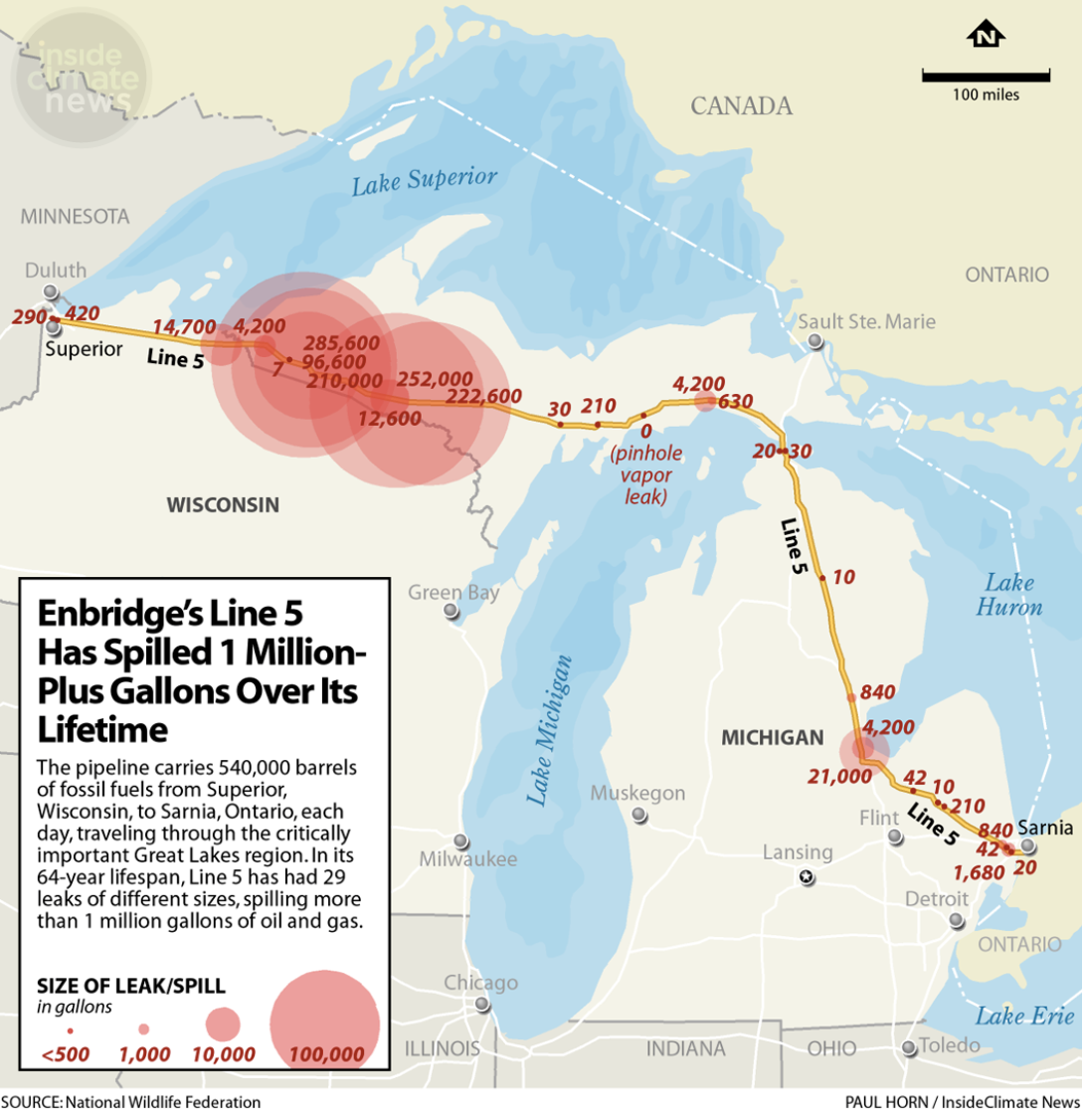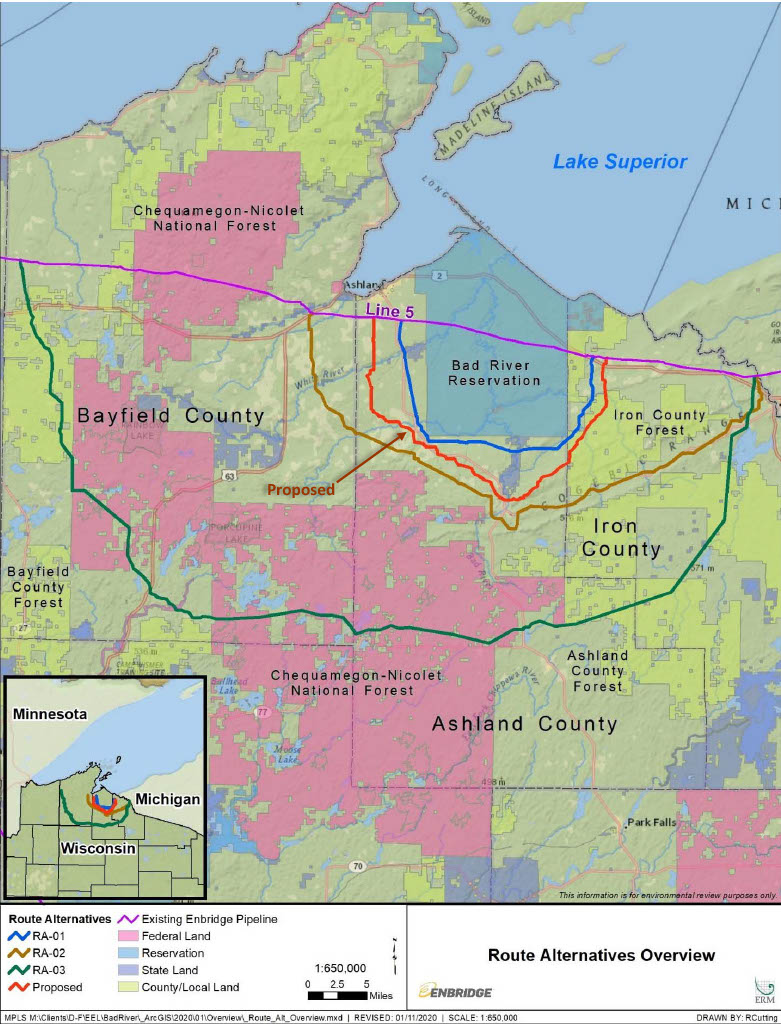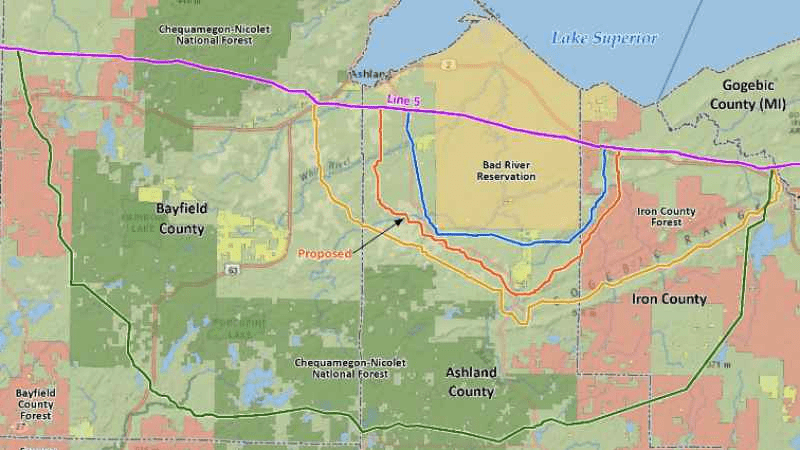Enbridge Line 5: A Vital Pipeline Traversing Wisconsin
Enbridge Line 5: A Vital Pipeline Traversing Wisconsin
Related Articles: Enbridge Line 5: A Vital Pipeline Traversing Wisconsin
Introduction
In this auspicious occasion, we are delighted to delve into the intriguing topic related to Enbridge Line 5: A Vital Pipeline Traversing Wisconsin. Let’s weave interesting information and offer fresh perspectives to the readers.
Table of Content
Enbridge Line 5: A Vital Pipeline Traversing Wisconsin

Enbridge Line 5 is a significant oil pipeline system spanning over 2,300 miles, traversing through Canada and the United States. Within the United States, the pipeline traverses through Michigan, Wisconsin, and Minnesota, playing a crucial role in the transportation of crude oil and refined petroleum products. This article focuses on the segment of Enbridge Line 5 that traverses Wisconsin, highlighting its importance, functionality, and ongoing debates surrounding its operation.
A Critical Link in the Energy Infrastructure
The Wisconsin segment of Enbridge Line 5 runs for approximately 120 miles, originating in Superior, Wisconsin, and terminating at the border with Michigan. The pipeline carries approximately 230,000 barrels of oil per day, primarily originating from the Canadian oil sands and destined for refineries in the Midwest and Great Lakes regions.
This segment of Line 5 plays a vital role in the energy infrastructure of the Midwest, contributing significantly to the region’s energy security. It supplies refineries with crude oil, which is subsequently processed into gasoline, diesel, jet fuel, and other essential petroleum products. These products are then distributed throughout the Midwest, fueling transportation, industries, and households.
The Economic Impact of Enbridge Line 5
The operation of Enbridge Line 5 generates significant economic benefits for Wisconsin. The pipeline supports numerous jobs directly through construction, maintenance, and operation, while indirectly contributing to employment in related sectors like refining, transportation, and retail.
Furthermore, the pipeline contributes to the tax base of Wisconsin through property taxes, sales taxes, and other revenue streams. The pipeline’s presence also attracts businesses and investments, further stimulating the state’s economy.
Environmental Concerns and Ongoing Debates
Despite its economic significance, the operation of Enbridge Line 5 has also raised environmental concerns. The pipeline traverses sensitive ecological areas, including wetlands and waterways, raising concerns about potential oil spills and their impact on the environment.
The potential for spills has been a subject of intense debate, with environmental groups advocating for the decommissioning of the pipeline, while energy companies argue for its continued operation, highlighting its economic benefits and safety measures.
Enbridge’s Commitment to Safety and Environmental Protection
Enbridge, the company operating Line 5, maintains that the pipeline is a safe and reliable means of transporting oil. The company emphasizes its commitment to environmental protection and highlights its comprehensive safety protocols, including regular inspections, maintenance, and spill prevention measures.
Enbridge also emphasizes its efforts to minimize environmental impact through responsible construction practices and mitigation measures aimed at protecting sensitive ecosystems.
The Future of Enbridge Line 5 in Wisconsin
The future of Enbridge Line 5 in Wisconsin remains uncertain, with ongoing debates and legal challenges surrounding its operation. Environmental groups continue to push for its decommissioning, citing concerns about potential spills and their impact on the environment.
Energy companies, on the other hand, argue for the continued operation of the pipeline, highlighting its economic benefits and safety measures. The outcome of these debates will have a significant impact on the energy landscape of Wisconsin and the region.
FAQs about Enbridge Line 5 in Wisconsin
Q: What is the purpose of Enbridge Line 5 in Wisconsin?
A: Enbridge Line 5 in Wisconsin is a crucial part of a larger pipeline system that transports crude oil from Canada to refineries in the Midwest and Great Lakes regions. This segment of the pipeline supplies refineries with the raw materials necessary to produce gasoline, diesel, jet fuel, and other essential petroleum products.
Q: What are the economic benefits of Enbridge Line 5 in Wisconsin?
A: Enbridge Line 5 contributes significantly to the Wisconsin economy through direct and indirect employment, tax revenue, and business investment. The pipeline supports jobs in construction, maintenance, operation, and related industries. It also generates revenue for the state through property taxes, sales taxes, and other sources.
Q: What are the environmental concerns associated with Enbridge Line 5 in Wisconsin?
A: The pipeline traverses sensitive ecological areas, including wetlands and waterways, raising concerns about potential oil spills and their impact on the environment. The potential for spills has been a subject of intense debate, with environmental groups advocating for the decommissioning of the pipeline.
Q: What measures are in place to mitigate environmental risks associated with Enbridge Line 5?
A: Enbridge, the company operating Line 5, emphasizes its commitment to environmental protection and highlights its comprehensive safety protocols, including regular inspections, maintenance, and spill prevention measures. The company also emphasizes its efforts to minimize environmental impact through responsible construction practices and mitigation measures aimed at protecting sensitive ecosystems.
Q: What is the future of Enbridge Line 5 in Wisconsin?
A: The future of Enbridge Line 5 in Wisconsin remains uncertain, with ongoing debates and legal challenges surrounding its operation. Environmental groups continue to push for its decommissioning, while energy companies argue for its continued operation. The outcome of these debates will have a significant impact on the energy landscape of Wisconsin and the region.
Tips for Understanding Enbridge Line 5 in Wisconsin
- Research and gather information: Explore credible sources like government reports, academic studies, and news articles to gain a comprehensive understanding of the pipeline’s operation, environmental impacts, and economic implications.
- Engage in respectful dialogue: Participate in discussions and debates surrounding Enbridge Line 5, fostering a respectful environment for diverse perspectives and opinions.
- Stay informed about ongoing developments: Monitor news updates and reports on the pipeline’s operation, regulatory decisions, and legal challenges.
- Consider the broader context: Recognize that the Enbridge Line 5 debate is part of a larger discussion about energy infrastructure, environmental sustainability, and economic development.
Conclusion
Enbridge Line 5 in Wisconsin is a complex issue with significant economic and environmental implications. The pipeline plays a vital role in the energy infrastructure of the Midwest, but its operation has also raised concerns about potential oil spills and their impact on sensitive ecosystems. The future of the pipeline remains uncertain, with ongoing debates and legal challenges surrounding its operation. Understanding the various perspectives and complexities surrounding Enbridge Line 5 is essential for informed decision-making and responsible stewardship of the environment and energy resources in Wisconsin.








Closure
Thus, we hope this article has provided valuable insights into Enbridge Line 5: A Vital Pipeline Traversing Wisconsin. We appreciate your attention to our article. See you in our next article!